The day road rage led to a treason charge in Zambia, as democracy falters in Africa
It began as a road rage incident between the president and opposition leader of Zambia, a southern African country once seen as a beacon of democracy.
Two political convoys were speeding along a perilously narrow rural road on April 8 when the opposition leader, Hakainde Hichilema, refused to pull off to let President Edgar Lunguâs caravan roar past â a move that landed him in jail facing treason charges and a possible death sentence.
Observers of African politics see Hichilemaâs arrest as part of a troubling trend in several nations in sub-Saharan Africa.
Video of the roadway incident shows the two convoys headed in the same direction, the presidential train of vehicles in the rear. As Lunguâs convoy tries to pass, police vehicles â with lights flashing and sirens blaring â occasionally dart toward Hichilemaâs convoy, apparently trying to intimidate his convoy to move over.
Hichilemaâs convoy refuses to budge, but Lunguâs convoy squeezes past anyway â as Hichilema supporters shout invective.
On Friday, Hichilemaâs case was adjourned for 15 days and he remains jailed, with no bail allowed in treason cases.
Zambia is a member of the small club of African countries that have seen two democratic transfers of power, a sign of strengthening democracy. But under Lungu, his vocal critics say, progress has been whittled away. Media and political freedoms are under attack and the independence of the Constitutional Court has been compromised, they charge.
Another opposition leader, Chilufya Tayali, was arrested last month for a Facebook post attacking police over Hichilemaâs arrest. Others were detained for trying to visit Hichilema in prison, after authorities banned anyone from seeing him.
Even Zambiaâs revered elder statesman â founding President Kenneth Kaunda â was turned away when he tried to visit. South African opposition leader Mmusi Maimane was denied entry to Zambia on Thursday.
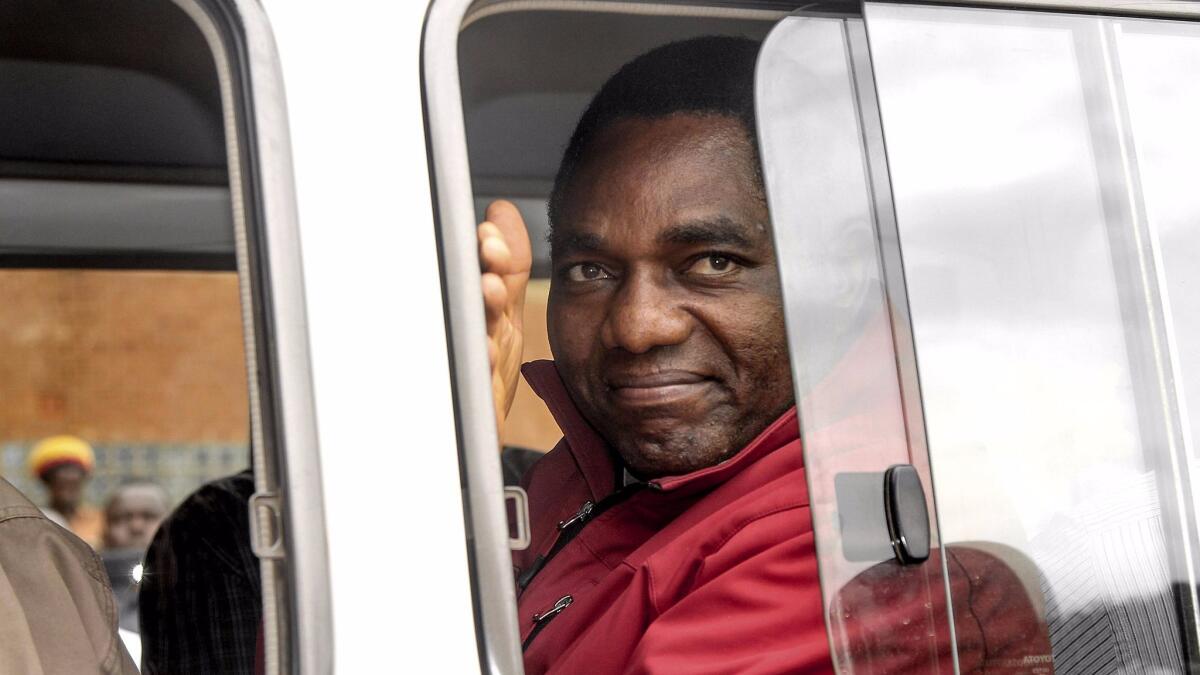
Zambiaâs backslide is worrying because it demonstrates how swiftly fragile democratic gains that took decades to cement can be destroyed. The African Union, the continental leadership body, has proved strong on protecting leaders from coups, but weak on presidents who undermine democratic institutions, like the media and courts, or overturn constitutional term limits, according to critics.
Even some African Union figures have expressed concern about presidents who cling to power for decades. In December, outgoing African Union commissioner for political affairs, Aisha Abdullahi, said the group needed to âdig beyond the surface of regular elections and remain engaged on what happens before, during and after elections.â
She added, âThere is also a worrying trend on the continent where incumbents harass opponents in the lead-up to and during elections, and use other practices such as manipulation of electoral timetables to disadvantage the opposition.â
Sub-Saharan Africa, with 50 countries and just under a billion people, is one of the worst regions for democracy globally. In 2016, just 12% of countries in the region were ranked as free by Freedom House, a pro-democracy watchdog, compared with 20% in 2014.
After democratic advances in the 1990s and early 2000s, many countries in Africa have regressed in recent years, according to Freedom Houseâs report on sub-Saharan Africa. Hereâs a look at other nations and how they are attempting to quash dissent.
Ethiopia: Criticizing the government on Facebook can be a crime
For posting an opinion on Facebook, you can be charged with terrorism and jailed.
Ethiopiaâs Federal High Court on Thursday sentenced an activist and former opposition party spokesman, Yonatan Tesfaye, to six years and three months in jail after Facebook posts about protests in the Oromia region in 2015.
After a violent crackdown on the protests, Tesfaye posted that the government was using âforce against the people instead of using peaceful discussion with the public.â
Another opposition leader, Merera Gudina, and more than 20 other opposition figures and activists have been jailed and face terrorism charges over the protests in Oromia.
âEthiopiaâs longtime muzzling of dissent has had a devastating effect on opposition members and human rights defenders who are completely prevented from exercising their right to freedom of expression and peaceful assembly,â Amnesty Internationalâs Michelle Kagari said last year, after opposition figures were beaten and forced to appear in court wearing only their underpants.
Democratic Republic of Congo: Opposition leaders who protest are jailed or killed
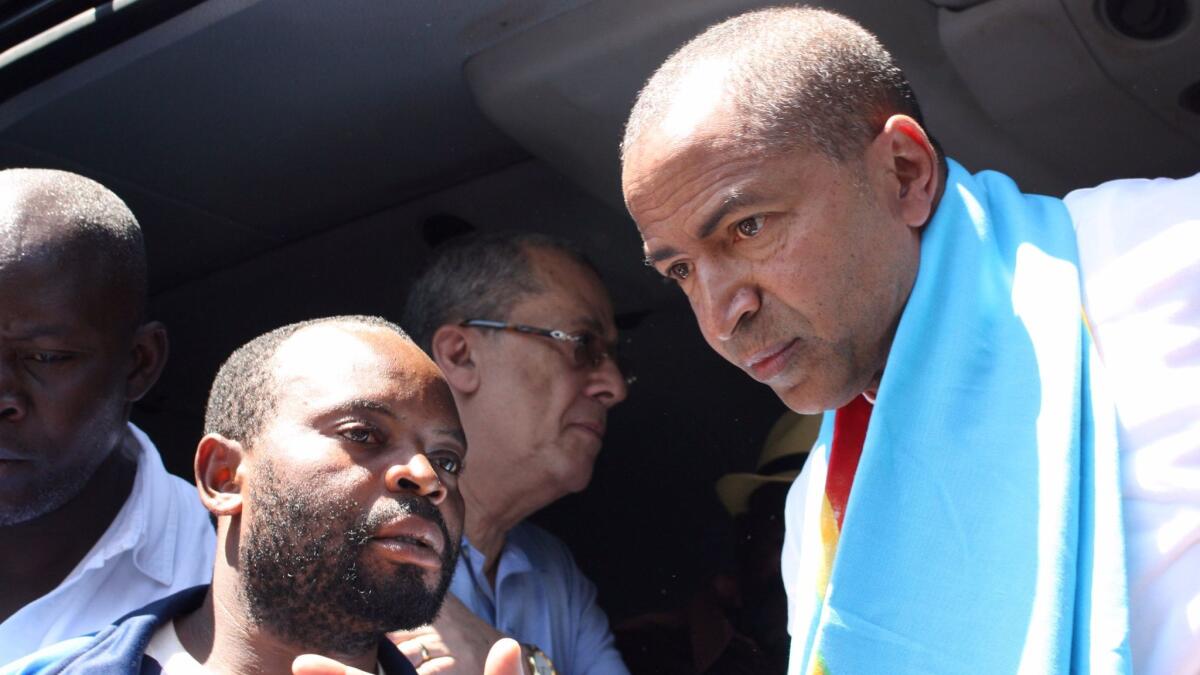
The Congolese government arrested dozens of pro-democracy activists, journalists and musicians in March 2015, including Fred Bauma and Yves Makwambala, who had launched a youth activist movement called Filimbi.
They have since been released from prison, but Bauma and Makwambala still face charges of terrorism and insurrection.
Protests erupted last fall when it became clear that President Joseph Kabila, whose term was to end in December, had no intention of leaving the presidency. Kabilaâs government banned opposition protests, and 66 people were killed in a violent crackdown on protests in September.
Kabila still holds on to power by repeatedly failing to organize elections â a policy opponents call glissement, or sliding.
Uganda: A prominent academic is jailed and ordered to undergo psychiatric tests for insulting the president
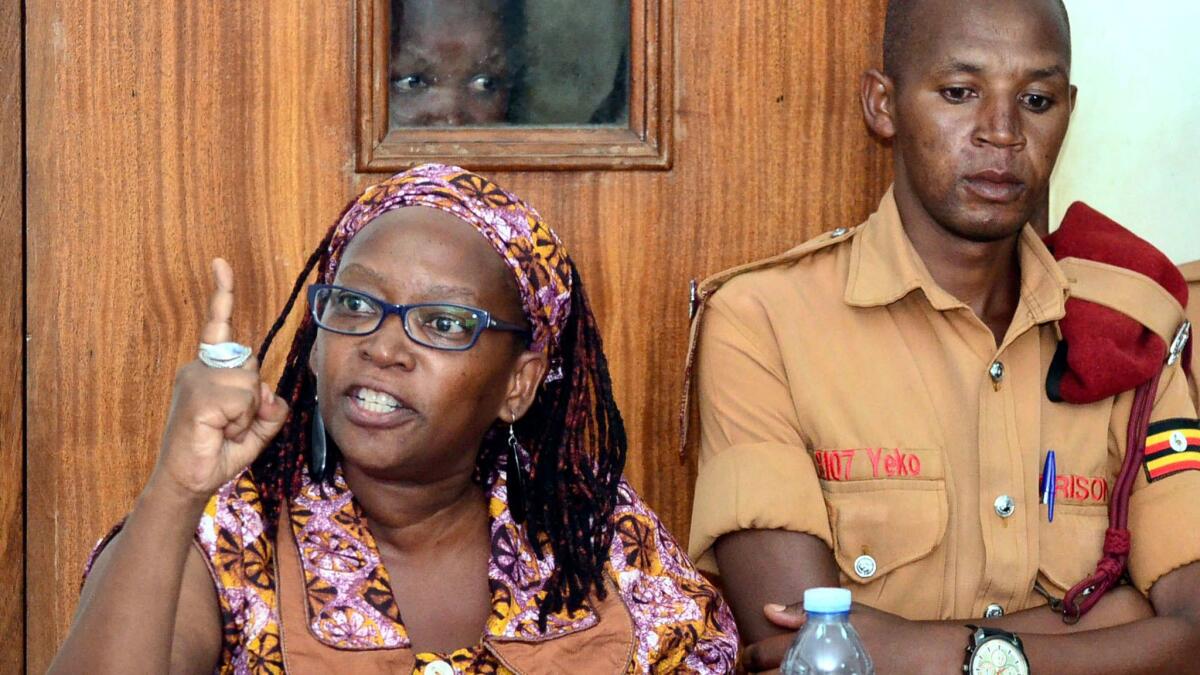
Ugandan academic and activist Stella Nyanzi was arrested and jailed last month for describing President Yoweri Museveni on her Facebook page as a âpair of buttocksâ and his wife as âempty-brained.â She was released on bail after an international outcry by human rights defenders, but faces two charges of cyberharassment.
Prosecutors are demanding that Nyanzi, a feminist academic and writer, undergo psychiatric tests to evaluate her sanity.
Museveni, who has ruled Uganda since 1986, insists his people want him to stay in power. He claims the opposition is made up of wolves ready to tear Uganda apart should he leave.
Opposition figures were repeatedly arrested in the lead-up to elections last year in which Museveni won another five-year term, his fifth.
Opposition leader Kizza Besigye, who came in second in the election, was arrested and charged with treason after rejecting the result, claiming fraud and calling on supporters to protest.
Rwanda: An opposition leader was jailed for 15 years; dissidents flee into exile
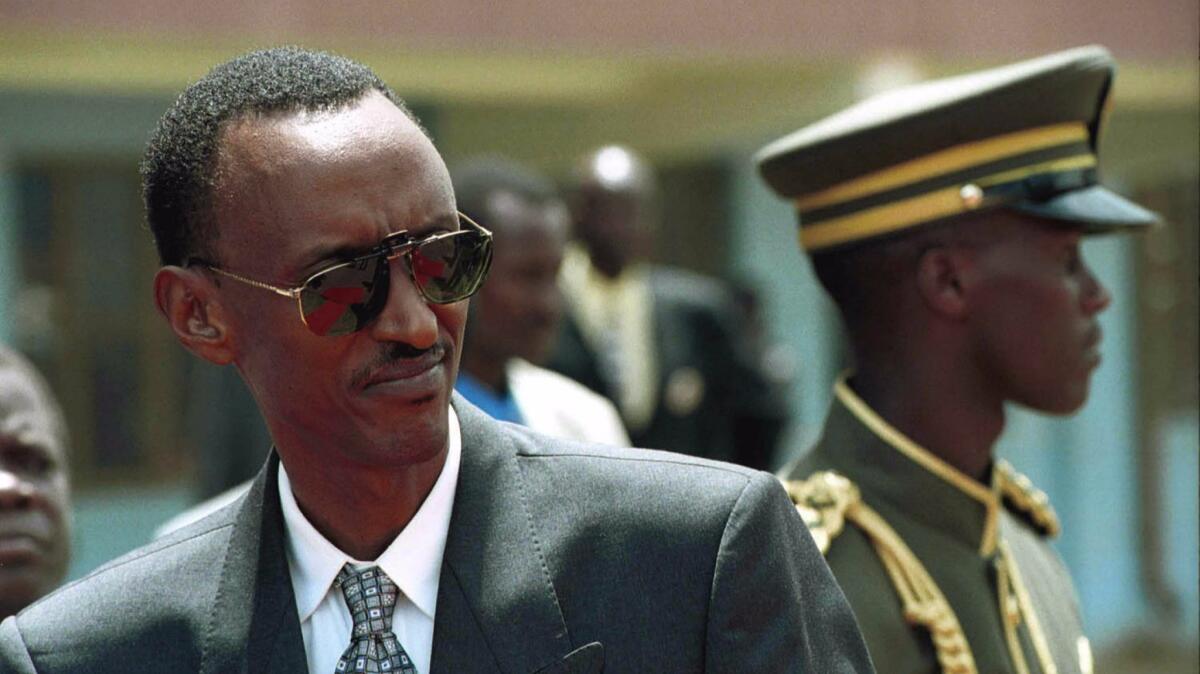
In Rwanda, President Paul Kagame has quietly steamrolled all opposition figures over the last decade.
A two-term presidential limit has been ditched and Kagame will face little opposition when he runs for a third seven-year term in August.
As soon as Rwandan businesswoman Diane Rwigara announced in May her intention to run against him, photographs of her sprawled on a couch in the nude appeared on the Internet. Her campaign was quickly in ruins.
Another Kagame opponent has ended up in prison. Opposition leader Victoire Ingabire was barred from running in elections in 2010. She was arrested that year and sentenced to 15 years in jail for terrorism, genocidal revisionism and provoking âdivisionism.â
Some government opponents have vanished without explanation.
In March last year, opposition activist Illuminee Iragena disappeared as she was on her way to work as a hospital nurse. Amnesty International believes that Iragena was tortured and died in custody, based on information from sources close to the case.
âIf she is in detention, her whereabouts should be immediately revealed and she should be charged or released. If she has died, the circumstances of her death must be promptly and thoroughly investigated and the authorities should make public the outcome of any such investigation,â said Sarah Jackson of Amnesty International in March.
âThere have been a number of recent cases of disappearances and this sets a worrying stage for the upcoming presidential elections in August. The failure of the authorities to provide answers contributes to the chilling environment for the political opposition in Rwanda,â she said.
Another opposition figure, Jean Damascene Munyeshyaka, disappeared on June 27, 2014, and has not been heard from since.
On New Yearâs Day that year, one of Kagameâs harshest critics, Patrick Karegeya, was found strangled in a South African hotel room. His killers were never tracked down.
Other dissidents have been attacked, and Rwandan authorities have been accused of hunting down dissidents and trying to assassinate them. Rwandan authorities reject the claims.
In a recent interview with Francophone Africa news site Jeune Afrique, Kagame rejected criticism of his government. âToo many givers of lessons, too many arrogant Westerners drunk on their own values claim to define on our behalf what freedom means to us. They consistently label us as ânot free,ââ he said.
Burundi: One of the worst places to be an opposition member
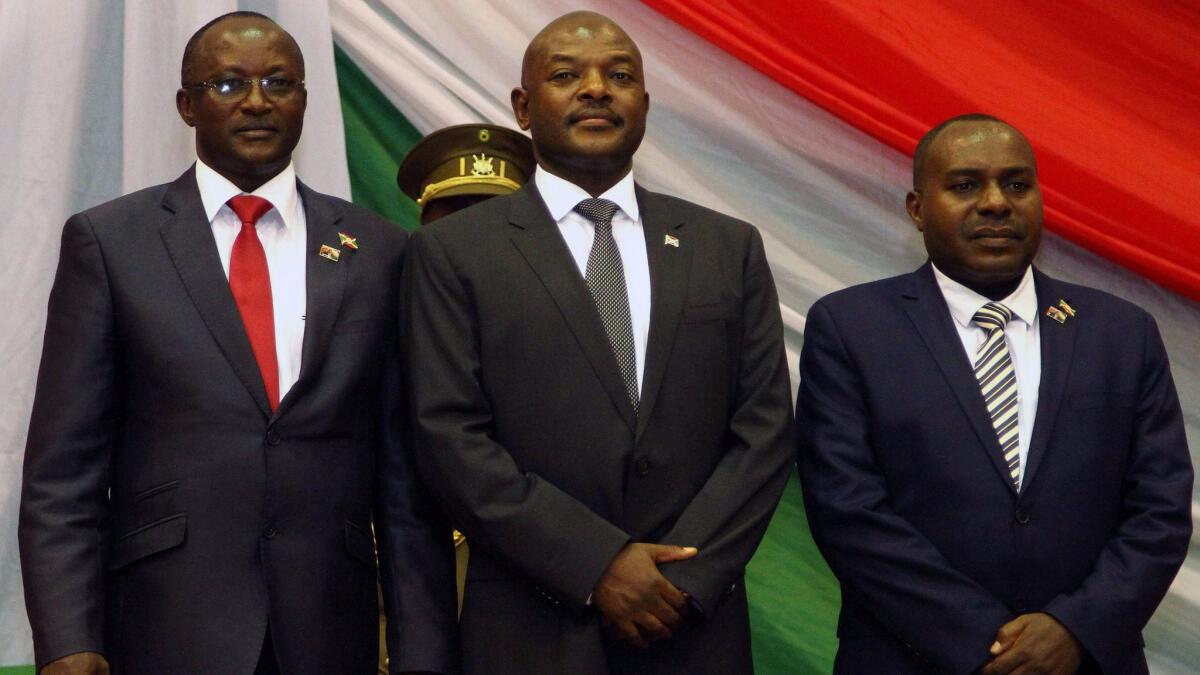
Burundi has been mired in violent conflict since President Pierre Nkurunziza defied the constitutional limit on a third term in office, despite widespread opposition in 2015. He took office swearing his opponents would be crushed by God after an election criticized by the
More than 210 people, many of them young men from opposition neighborhoods, disappeared between October and January, according to the United Nations. Amnesty International reported that dozens were shot to death by security forces in a crackdown in December. In January, 22 bodies were found.
Most opposition figures have fled the country, while many others who opposed Nkurunzizaâs third term have been arrested or killed. A U.N. report last September verified 564 executions â mainly of journalists, activists and opposition supporters â and detailed torture and rape of government opponents.
The presidentâs spokesman, Willy Nyamitwe, said the U.N. investigators were lazy and the report was biased and âbased on flying rumors and gossip.â
Sign up for Essential California
The most important California stories and recommendations in your inbox every morning.
You may occasionally receive promotional content from the Los Angeles Times.







